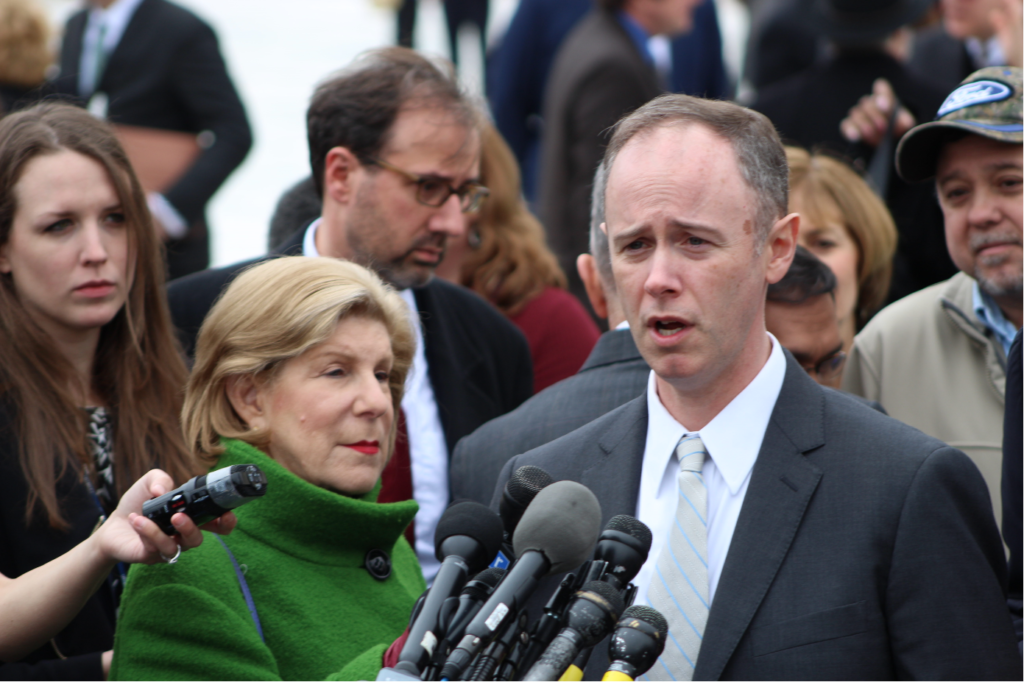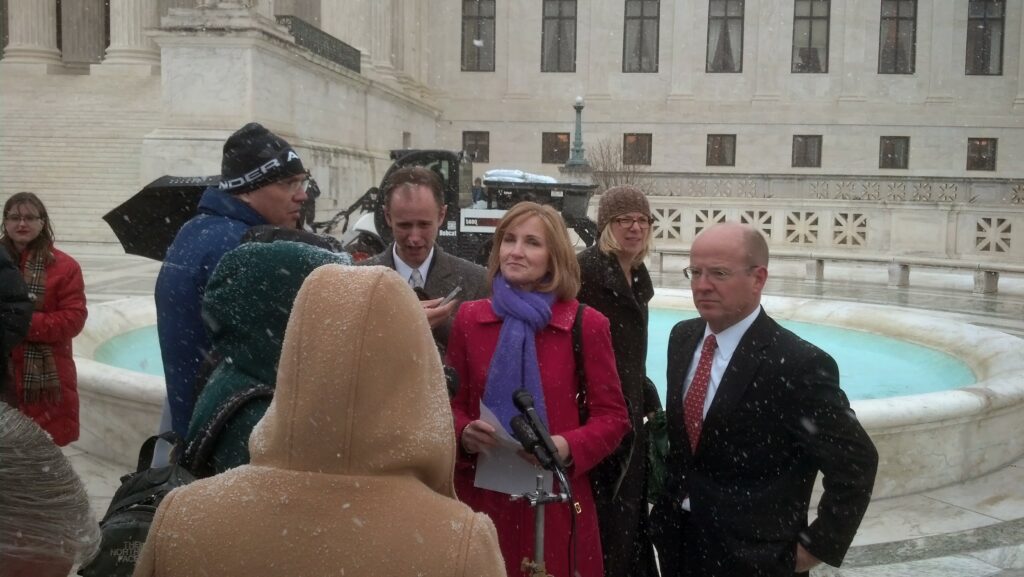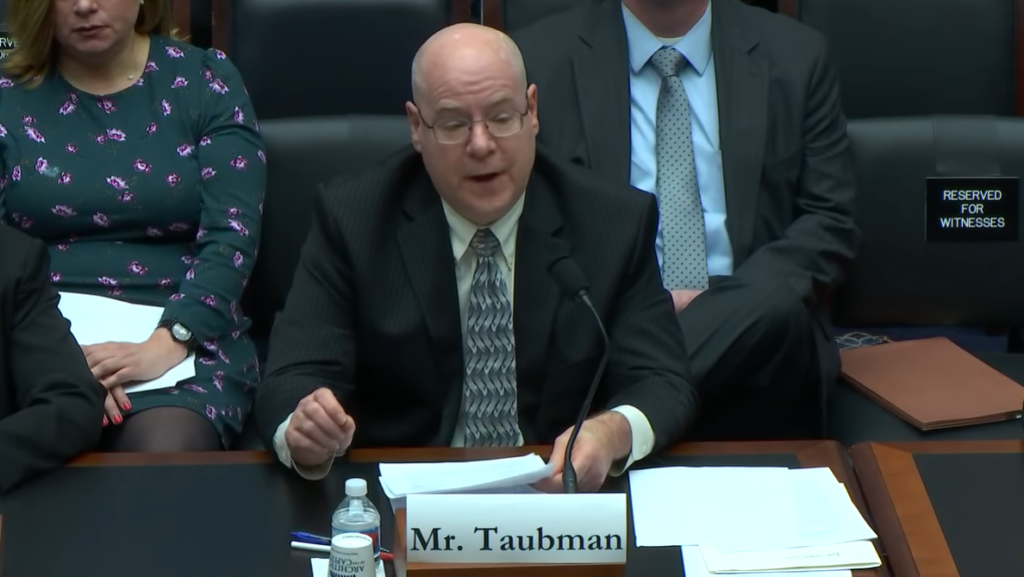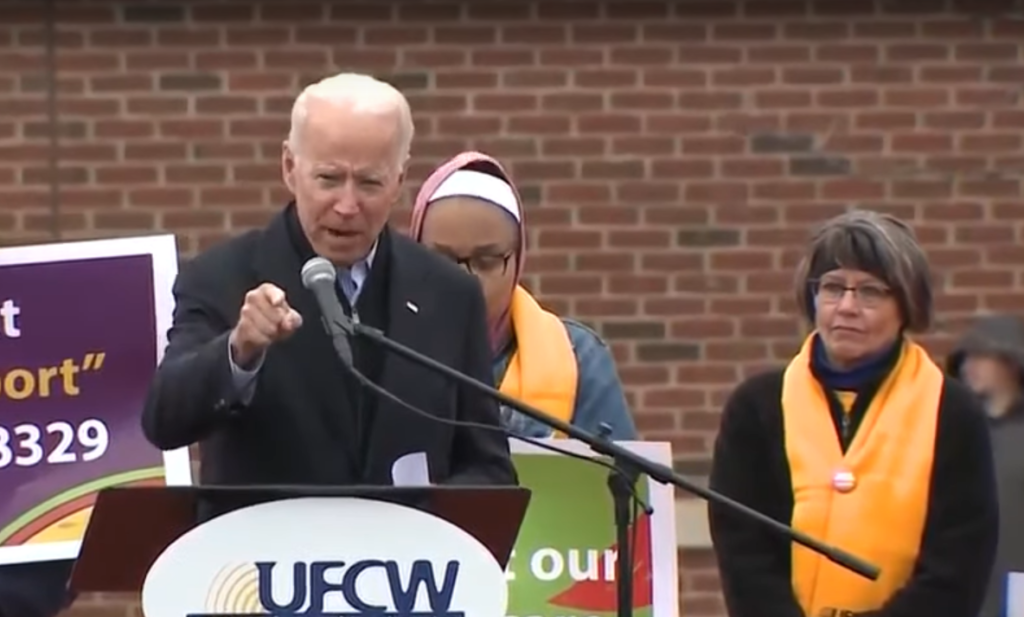Airline Workers Contest Union ‘Opt-Out’ Requirement for Political Dues
The following article is from the National Right to Work Legal Defense Foundation’s bi-monthly Foundation Action Newsletter, July/August 2019 edition. To view other editions or to sign up for a free subscription, click here.
Union bosses bullied and illegally threatened to discipline employee who defied strike demands
United Airlines fleet service employee Arthur Baisley (left) and JetBlue pilot Christian Popp (right) are challenging union boss “opt-out” rules that make nonmembers pay for union political spending without their consent.
AUSTIN, TX – United Airlines fleet service employee Arthur Baisley and JetBlue Airlines pilot Christian Popp have filed federal lawsuits against the International Association of Machinists (IAM) and Air Line Pilots Association (ALPA) unions, respectively, challenging union officials’ “opt-out” requirements designed to make non-members pay for union political activities without their consent.
Austin, TX-based Baisley and Fort Lauderdale, FL-based Popp filed their lawsuits with free legal aid from the National Right to Work Foundation. Their Foundation staff attorneys argue that the “opt-out” schemes perpetrated by IAM and ALPA bosses violate workers’ rights under the Railway Labor Act (RLA) and the First Amendment under the standard laid out in the landmark 2018 Supreme Court decision Janus v. AFSCME.
“No employee or private citizen should be trapped in a deliberately-complex system that funnels their money into political speech of which they disapprove. Unfortunately, that is exactly what IAM and ALPA union officials are doing to non-member workers across America,” commented National Right to Work Foundation Vice President and Legal Director Ray LaJeunesse.
The lawsuits contend that under Janus and the 2012 Knox v. SEIU Supreme Court case – both of which were argued and won by Foundation staff attorneys – no union dues or fees can be charged for union political activities without a worker’s affirmative consent.
Popp and Baisley, despite working in the Right to Work states of Florida and Texas, must still pay fees to their respective unions as the RLA preempts state law and permits forced dues. But, even in the absence of Right to Work protections, established Supreme Court precedent forbids unions from putting those compulsory fees towards ideological activities like lobbying or politics.
According to the lawsuits, the processes that IAM and ALPA union bosses require independent-minded workers to go through simply to exercise their constitutional right not to fund “nonchargable” activities are convoluted and typically involve having to “decipher” the opt-out requirements of the union.
Even worse, after Baisley submitted a letter to IAM agents in November 2018 objecting to funding all union political activities, the union officials only accepted his objection for 2019, and told Baisley he would be required to renew his objection to full dues and fees the next year or else be charged for full union dues.
The two complaints challenge these union boss-created policies on the grounds that they “require employees to opt-out of paying union fees that they have no legal obligation to pay” and thus violate workers’ First Amendment rights.
The complaints also allege that the “opt-out” requirements violate the RLA, which governs labor in the air and rail industries and “protects the right of employees to ‘join, organize, or assist in organizing’ a union of their choice as well as the right to refrain from any of those activities.”
Both suits are class-action, and seek court orders requiring union officials to ask for affirmative employee consent for any dues charged for political or ideological purposes in the future.
“These lawsuits show that although Janus’ most direct impact was to secure the First Amendment rights of public employees not to be required to fund Big Labor, the implications don’t stop there,” observed LaJeunesse. “Because the Janus decision made clear workers must opt-in to all political and ideological activity, Foundation staff attorneys are able to cite it in defense of airline workers covered by the Railway Labor Act.”
Final Briefs Filed at Appeals Court in Continuation of Janus v. AFSCME
The following article is from the National Right to Work Legal Defense Foundation’s bi-monthly Foundation Action Newsletter, September/October 2019 edition. To view other editions or to sign up for a free subscription, click here.
Foundation seeks first-in-nation appellate court ruling to order non-member dues refunded
Veteran Foundation staff attorney William Messenger, seen here speaking to reporters after Supreme Court oral arguments in Janus, leads the Foundation’s Janus enforcement task force.
CHICAGO, IL – Although Janus v. AFSCME secured a landmark victory at the U.S. Supreme Court for government employees’ First Amendment rights, Mark Janus’ case is not over because AFSCME union bosses have refused to return the funds taken from him in violation of the First Amendment.
Janus’ attorneys from National Right to Work Foundation and Illinois-based Liberty Justice Center have completed briefing with the Seventh Circuit Court of Appeals on the issue of whether union officials can keep money they seized from non-members in violation of their constitutional rights. The case is likely to mark the first time an appellate court will rule on the issue, potentially establishing a precedent that could result in the return of hundreds of millions of dollars seized by union bosses in violation of the Janus precedent.
Janus Secured Workers’ First Amendment Rights
Mark Janus was an Illinois child support specialist whose case was successfully argued at the Supreme Court by National Right to Work Foundation staff attorney William Messenger.
The Supreme Court’s June 27, 2018, decision in Janus’ favor found that any union fees taken from workers like Mark Janus – who was not a member of AFSCME – without the workers’ affirmative and knowing consent violate the First Amendment. Justice Samuel Alito wrote for the majority that compulsory fees “[violate] the free speech rights of non-members by compelling them to subsidize private speech on matters of substantial public concern.”
The Supreme Court sent the case back to the lower courts to determine, among other things, whether Janus is entitled to all the union fees he was forced to pay since March 23, 2013.
Janus’ appeal comes after a district court judge ruled that union officials are not required to refund forced fees seized from non-member workers prior to the Janus decision.
“Just like a thief would not be allowed to keep the money he stole, union bosses must be forced to return funds unlawfully seized from workers,” said National Right to Work Foundation Vice President and Legal Director Ray LaJeunesse. “It would be a massive injustice to deny workers victimized by Big Labor the refunds to which the Supreme Court made clear they are entitled.”
Seventh Circuit Likely First Appeals Court to Rule on Non-member Refunds
Janus will likely be the first case in which an appellate court will evaluate the so-called “good faith” defense that union lawyers have asserted in response to worker lawsuits seeking refunds, arguing that union officials should be allowed to keep funds seized prior to the Janus decision.
This contention has generally succeeded in lower courts despite the Supreme Court asserting that union bosses have been “on notice” for years that mandatory fees likely would not comply with the heightened level of First Amendment scrutiny articulated in the Supreme Court’s earlier Knox v. SEIU decision, also won by Foundation staff attorneys.
Mark Janus is asking the Seventh Circuit to rule that he is entitled to refunds of approximately $3,000 in fees he was forced to pay since March 23, 2013, as the statute of limitations permits. In addition, the case has significant implications for dozens of other cases being litigated around the country for hundreds of thousands of other workers seeking the return of forced fees seized unlawfully by union officials.
Janus Refund Efforts Continue Nationwide
Foundation staff attorneys are currently litigating over a dozen such cases that collectively seek over $120 million in refunds for non-members forced to pay union fees before Janus. Other ongoing lawsuits and potential cases could result in half a billion dollars or more returned to government workers from union treasuries.
“The Janus case is a milestone of worker freedom, but union bosses continue to block workers from exercising their rights and deny workers refunds for dues and fees seized against their wishes,” said LaJeunesse. “We hope the Seventh Circuit Court of Appeals will follow the clear logic of the Supreme Court’s decision in Janus and establish that union bosses cannot profit from violating workers’ First Amendment rights.”
Feds Close Obama-Era Loophole Sanctioning Big Labor Medicaid Skim
The following article is from the National Right to Work Legal Defense Foundation’s bi-monthly Foundation Action Newsletter, July/August 2019 edition. To view other editions or to sign up for a free subscription, click here.
Foundation-backed rule clarification takes aim at SEIU’s illicit $100 million per year money grab
In the 2014 Harris case, the U.S. Supreme Court prohibited union officials from requiring the diversion of Medicaid payments from providers like Susie Watts (center), pictured at the High Court with her Foundation attorney William Messenger (left) and Foundation President Mark Mix (right).
WASHINGTON, D.C. – Spurred by National Right to Work Foundation supporters, the Department of Health and Human Services (HHS) issued a final rule in May, making it clear that the diversion of Medicaid payments from home healthcare providers to union bosses violates federal Medicaid law.
This Foundation-backed rule change closes an illegal loop-hole created by the Obama Administration to provide union officials with legal cover to siphon hundreds of millions of dollars in Medicaid funds into union political and lobbying activities.
As a giveaway to the Obama Administration’s political backers, in 2014, the Obama HHS created a regulation to give legal cover to ongoing schemes by the SEIU and other unions that siphoned off over $1 billion in Medicaid funds.
However, the Medicaid law was clear that taxpayer-funded Medicaid money must go directly to healthcare providers, many of whom care for their own family members in their own homes, and cannot be diverted to third parties. The Obama rule was issued as Foundation staff attorneys were shining the spotlight on the illegal scheme in federal court.
The 2014 Foundation-won U.S. Supreme Court Harris v. Quinn decision held it is unconstitutional for states to force homecare providers paid through Medicaid programs to pay union fees. In Harris, the Court ruled that a scheme imposed by the State of Illinois, in which more than 80,000 individual homecare providers were forced to pay union fees out of the state funding they receive, violated the providers’ First Amendment rights.
Rather than fold up the scheme as a result of the Supreme Court ruling, Obama operatives chose to skirt the law.
The Obama Administration helped Big Labor continue to skim over $100 million per year from healthcare providers by authorizing states to “assign” a portion of providers’ funds directly to union officials.
“The Harris decision, won by the Foundation in 2014, made it illegal for states to require these providers to pay fees to union officials,” said National Right to Work Vice President Patrick Semmens. “But with the help of the Obama Administration, union bosses attempted to undermine that ruling by scheming to continue deducting union dues from Medicaid payments, even from providers who never knew they could not be required to pay.”
When the new administration took office in 2017, a window of opportunity opened to reverse Obama’s giveaways to Big Labor. In 2017, the Foundation formally brought the illegal-dues skim scheme to the attention of the Trump Administration.
Soon after Foundation President Mark Mix personally raised the issue again at a White House meeting in 2018, the Trump Administration issued the proposed rule to make it clear that states cannot allow union bosses to intercept tax dollars intended for Medicaid recipients.
By the August 2018 public commenting deadline, the Foundation filed detailed comments on how the scheme violates the law and how the Trump Administration should fix it. The Foundation also rallied thousands of supporters to petition the Trump Administration to enforce the Medicaid statute by ending the illegal diversion of Medicaid funds into Big Labor coffers.
“This long-overdue rule is another important step forward in protecting the rights of homecare workers from greedy union bosses,” added Semmens. “While the rule will still need to be robustly enforced and Foundation staff attorneys are already preparing to do just that, this decision by the Department of Health and Human Services is encouraging.”
Foundation Staff Attorney Testifies Before Congressional Hearing on Labor Law
The following article is from the National Right to Work Legal Defense Foundation’s bi-monthly Foundation Action Newsletter, July/August 2019 edition. To view other editions or to sign up for a free subscription, click here.
Current labor law is ‘antithetical to American values of free speech and free association’
Veteran Foundation staff attorney Glenn Taubman testified before Congress that current labor law allows union bosses to violate the rights of workers and urged Congress to make union dues payments and association voluntary.
WASHINGTON, D.C. – National Right to Work Foundation staff attorney Glenn Taubman recently testified at a U.S. House of Representatives committee hearing, urging reform of current labor law that hinders American workers from exercising their rights under the U.S. Constitution and National Labor Relations Act (NLRA).
Taubman has represented hundreds of workers in cases before the National Labor Relations Board (NLRB) and in federal court as a veteran Foundation staff attorney.
Given his expertise on labor law, Taubman was asked to be the sole pro-Right to Work witness, testifying before the House of Representatives Committee on Education and Labor Subcommittee on Health, Employment, Labor, and Pensions at its hearing on “The Need for Labor Law Reform.”
Taubman told the House Committee on March 26 that union bosses use current labor law to force millions of private sector workers to accept union monopoly representation just to get or keep a job.
“No worker in America should be threatened with discharge from his or her workplace for refusing to pay dues and fees to a private organization he or she may despise,” Taubman testified. “Yet this is the reality for millions of private sector workers today under the compulsory dues and monopoly bargaining regimes of the NLRA.”
Taubman exposed several specific ways that current labor law violates workers’ rights. He explained that “current law makes it easier for employees to form and join a union than it is for those same employees to decertify the union,” adding that a web of bureaucratic red tape blocks countless employees from removing unions opposed by most workers.
Taubman argued forced dues and monopoly bargaining, also known as “exclusive representation,” violate workers’ rights to free speech and free association by forcing them to be represented by and pay fees to a private organization.
Even in states with Right to Work legislation, which protects employees’ right to choose whether or not to subsidize a union, union officials impose obstacles to prevent employees from changing their minds and cutting off union dues.
Taubman urged reform of the standards for financial transparency to expose how union dues are spent, citing recent examples of corruption and abuse of union funds. He also suggested passing several pieces of legislation to safeguard workers from compulsory unionism’s abuses, including the National Right to Work Act, which would give every individual worker covered by the NLRA and Railway Labor Act the freedom to decide whether or not to fund union officials’ activities.
Taubman cited the case of nurse Jeanette Geary as an example. Taubman helped Geary win her landmark case at the NLRB earlier this year while providing her with free legal aid. The NLRB decided favorably for Geary nine years after she first filed her case, ruling that union officials can never charge non-members for lobbying expenses.
The Foundation-won U.S. Supreme Court Beck decision provides some protection for workers like Geary against being charged for political and ideological union expenditures. Taubman pointed out, however, that union officials still continue spending forced dues for political activity.
“Changes to current labor law are long overdue, but the House Committee majority’s push to make it easier for workers to be forced into union ranks would move the law in the wrong direction,” commented National Right to Work Foundation President Mark Mix. “Reforms to federal labor laws are certainly long overdue, but what is needed is a reorientation towards voluntary unionism.”
Stop & Shop Strike Fallout: Grocery Worker Hits UFCW with Two Federal Charges
The following article is from the National Right to Work Legal Defense Foundation’s bi-monthly Foundation Action Newsletter, July/August 2019 edition. To view other editions or to sign up for a free subscription, click here.
Union bosses bullied and illegally threatened to discipline employee who defied strike demands
Ardent forced dues-supporter and former Vice President Joe Biden joined with UFCW bosses on the picket lines during the Stop & Shop strike, even as UFCW officials were violating the rights of rank-and-file workers.
NORTHAMPTON, MA – Stop & Shop employee Matthew Coffey, one of thousands across New England who were ordered to strike by United Food and Commercial Workers (UFCW) union bosses in April, has filed two unfair labor practice charges against the union for violating his rights before, during and after the strike.
Coffey charges that UFCW officials lied to him about union membership requirements at the beginning of his tenure with Stop & Shop, misinformed him about his right to continue working during the strike, targeted him with personal slurs when he did decide to keep working and finally tried to illegally discipline him once the strike concluded.
According to his first charge, union officials led Coffey to believe that Stop & Shop is a “closed shop.” As a result, he joined the UFCW when hired in 2017, under the impression that union membership was required to keep his job.
It wasn’t until the April strike that he discovered “closed shops” are illegal under federal law and he had the legal right to refrain from formal union membership.
With this new knowledge, he returned to work and filed his first charge against UFCW Local 1459 with free legal aid from National Right to Work Foundation staff attorneys. That charge detailed union lies about his right to refrain from union membership and resign before the strike.
It also detailed harassment he endured, including personal slurs, because he exercised his right to work during the strike.
After the strike ended, UFCW officials weren’t finished with Coffey. Union agents mailed him a letter, threatening to discipline him for disobeying the strike order and demanding that Coffey appear before a union kangaroo court to defend himself.
Coffey responded by filing a second unfair labor practice charge.
“Matthew Coffey endured bullying and intimidation from UFCW union bosses, simply for choosing to resign his union membership and continue to work and provide for his family,” commented National Right to Work Foundation Vice President Patrick Semmens.
“Unfortunately, this is not an uncommon story. Union boss-ordered strikes are frequently rife with intimidation and violations of workers’ rights, and the Foundation plays a major role in ensuring workers subjected to such malfeasance have a voice.”
Supreme Court Asked to Uphold First Amendment Rights of Childcare Providers
The following article is from the National Right to Work Legal Defense Foundation’s bi-monthly Foundation Action Newsletter, July/August 2019 edition. To view other editions or to sign up for a free subscription, click here.
High Court should strike down scheme forcing business owners under SEIU representation
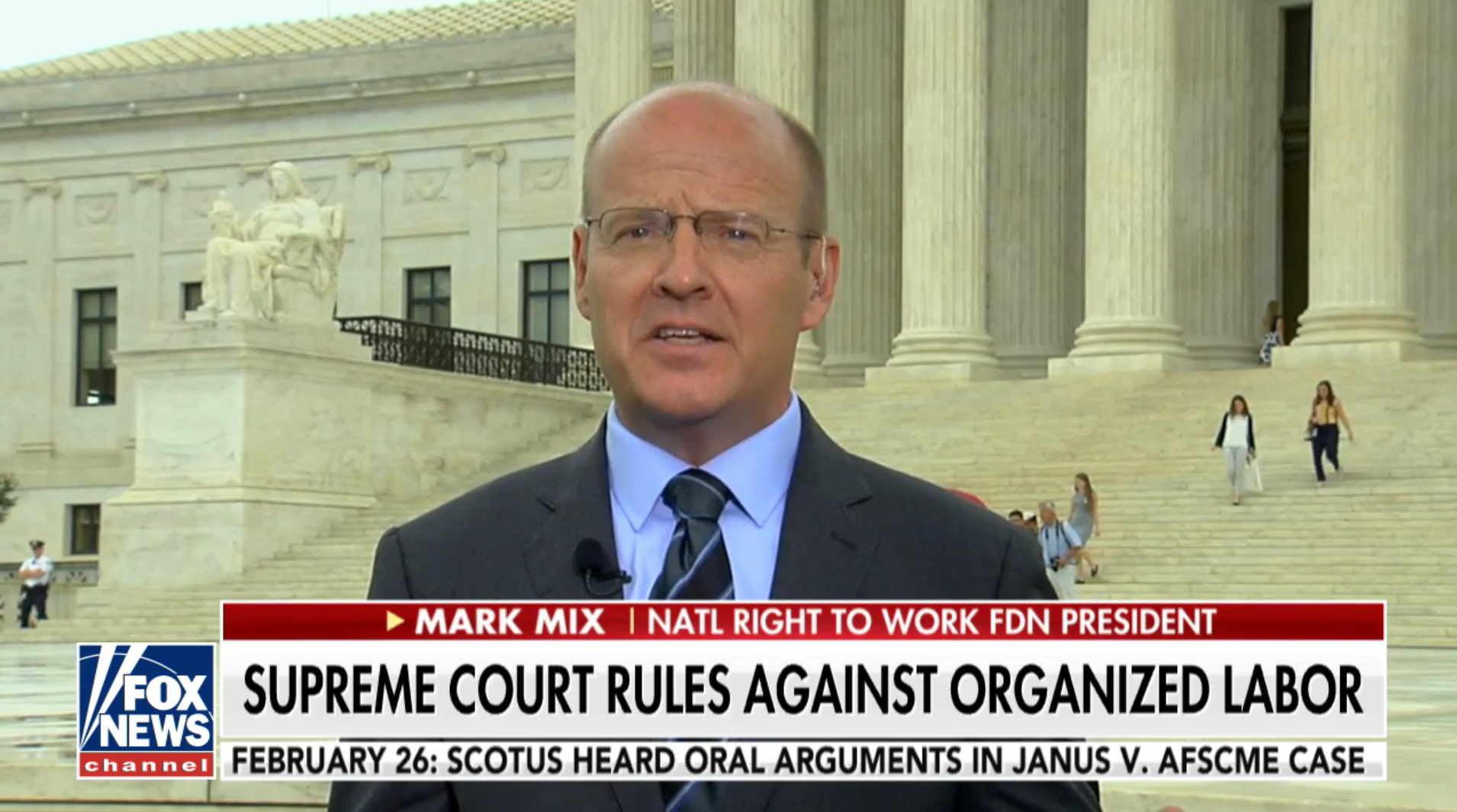
Citing the Foundation-won Janus v. AFSCME First Amendment victory, childcare provider Katherine Miller is asking the High Court to apply the same First Amendment scrutiny to forced union association.
WASHINGTON, D.C. – Katherine Miller runs a small childcare business out of her home in White Salmon, Washington, providing daycare for local children. When she and other childcare providers in the state found themselves forced to associate with the radical Service Employees International Union (SEIU), they turned to the National Right to Work Legal Defense Foundation for legal assistance in defending their rights.
Miller and thousands of other Washington State childcare providers often look after children from low-income families whose childcare costs are subsidized by the Washington State government. Merely because part of her business revenue includes these subsidies, the government claims she is a “public employee” solely for the purposes of union representation. As a result, Washington granted SEIU the power to force her under their union monopoly bargaining scheme and dictate the terms of how she runs her home-based business.
Faced with being forced under an SEIU monopoly against her will, Miller, along with another childcare business owner, Cindy Mentele, filed a federal lawsuit with the help of National Right to Work Legal Defense Foundation staff attorneys in 2016. Their lawsuit challenged Washington’s policy as an infringement of their First Amendment right of free association.
“If SEIU bosses and their allies in Washington’s government can coerce a woman who runs a small childcare business in her own home into associating with a union, then there is no legal limit to who can be forced to accept a government-appointed ‘representative’ to speak to and lobby the government for them,” observed National Right to Work Foundation President Mark Mix.
After the frequently overturned Ninth Circuit Court of Appeals decided against her in February, Miller and her Foundation staff attorneys filed a petition asking the U.S. Supreme Court to take the case. Mentele, sick of waiting for her First Amendment rights to be protected by the courts and her state government, has since stopped accepting children who are in thestate’s low-income subsidy program.
“The ugly message that the State of Washington’s current law sends is: If you want your freedom of association protected, your business will need to discriminate against children from low-income families,” added Mix.
The petition asks the court to hold government-mandated forced “representation” to the same standard that led the Supreme Court to find in the landmark 2018 Janus v. AFSCME decision that forced union fees violate the First Amendment. In that ruling, the Supreme Court also held that government-granted union monopoly bargaining power over public employees is “a significant impingement on associational freedoms that would not be tolerated in other contexts.”
In this case, Miller maintains that Washington’s policy breaches the First Amendment by forcing her to associate with union officials whose representation she doesn’t want and to which she didn’t consent. Miller’s argument also cites the High Court’s holding in the 2014 Harris v. Quinn case, which invalidated forced union fees for similar home-based care providers on the grounds that they are not full-fledged “public employees.”
The petition argues that finding, in combination with the Supreme Court’s observation in Janus regarding forced association in “other contexts,” warrants Supreme Court review.
Foundation staff attorneys successfully argued and briefed both the Janus and Harris cases at the Supreme Court. In both cases the Supreme Court applied a heightened level of “exacting” First Amendment scrutiny to the government-imposed forced dues, which is what Miller asks the Court to apply in her case challenging forced association with a union.
“Based on misinterpretations of not only Janus, but also earlier Foundation-won Supreme Court precedents, courts across the country have looked the other way as union bosses and their allies in government have come up with increasingly outrageous schemes to force individuals under union monopolies against their will,” said Mix. “Forcing individuals under union boss representation against their will is at the core of all of Big Labor’s coercive powers, and it is time for the Supreme Court to step in and acknowledge that government-appointed representation is not compatible with First Amendment freedom of association.”
Michigan Workers Halt Union Bosses’ Tactics to Undermine Right to Work
The following article is from the National Right to Work Legal Defense Foundation’s bi-monthly Foundation Action Newsletter, May/June 2019 edition. To view other editions or to sign up for a free subscription, click here.
Rather than face Foundation attorneys, union officials back down from forced-dues schemes
Since Right to Work legislation was signed into state law in December 2012, Foundation staff attorneys have provided free legal aid in more than 100 cases in Michigan for workers like Jeffery Hauswirth as they combat forced unionism abuses.
MICHIGAN – Since the 2012 passage of Right to Work legislation in Michigan, Foundation staff attorneys have provided free legal assistance to Michigan workers, challenging compulsory unionism’s abuses in more than 100 cases.
Developments in Foundation cases in recent months show that, despite dozens of victories for workers, Michigan union bosses continue attempting to cling to their forced-fees power by stifling employees’ rights.
Karen Ellis, who works at Vocational Independence Program, an adult education school in Flint, won a settlement against Teamsters Local 332 with free legal aid from Foundation staff attorneys. She filed charges after union officials ignored her union dues deduction revocation and threatened to sue her to force her to pay union dues.
In February 2017, during a contract hiatus after Teamsters Local 332’s monopoly bargaining contract over her and her coworkers expired, Ellis hand-delivered a letter to union officials notifying them that she resigned from union membership and revoked her authorization for union dues deductions from her paycheck. She sent another letter two days later to reiterate that, and additionally notified Local 332’s international affiliate in a letter two weeks later.
Teamsters union bosses waited nine months before notifying Ellis in November 2017 that they refused to honor her revocation of dues deduction authorization. They claimed she owed union dues of nearly $300, threatening to sue if she did not pay. Union officials also filed a grievance against her employer, for honoring her revocation and stopping the deduction of dues from her paycheck.
Even after Ellis reiterated her revocation — in November 2017 and again in February 2018, during another contractual hiatus — union officials refused to honor her revocation and threatened to sue.
Ellis sought free legal aid from Foundation staff attorneys to challenge Teamsters Local 332’s demands as a violation of the National Labor Relations Act, by blocking her from exercising her right to refrain from union membership and paying union dues.
Rather than face Foundation attorneys, Local 332 officials decided to settle. They will honor Ellis’ original dues deduction revocation submitted in 2017. Additionally, union officials will post a notice informing the school’s employees of their right to choose whether or not to join and support a union.
Ellis’ settlement is one of many, as Foundation attorneys enforce the Wolverine State’s Right to Work protections for employees.
Unfair labor practice charges brought by Foundation staff attorneys for several Michigan public school employees against the Michigan Education Association (MEA) have forced union officials to settle, halting “window period” schemes undermining Michigan’s Right to Work Law.
After Michigan’s Right to Work Law went into effect in 2013, public school employees Lindsey Bentley, Mary Derks, Sarah Evon, Jeffery Hauswirth, Becky Lapham, Shannon Rochon and Michael Rochon each resigned their membership in the MEA and its local affiliates.
However, union officials refused to acknowledge the resignations, citing a “window period” policy that limited members to exercising their right to resign union membership during the month of August. Union officials claimed that the workers owed membership dues until the next “window period” to resign came around in August 2014, which was for many of the workers nearly a full year after their resignation. MEA officials also threatened to use collection agencies to collect dues the union claimed to be owed.
The workers all sought free legal aid from National Right to Work Foundation staff attorneys, who assisted them in filing unfair labor practice charges at the Michigan Employment Relations Commission (MERC) against MEA and its local affiliates. Their charges were held in abeyance pending the result of another case, Snyder, in which Foundation staff attorneys provided legal aid to public school employees challenging the MEA’s “window period” policy.
The MERC ruled in Snyder that the MEA and its affiliates violated the state’s Right to Work protections for public employees, by illegally restricting employees’ right to resign union membership and by attempting to collect dues under the unlawful policy.
After losing to Foundation staff attorneys in court in Snyder, MEA officials decided to settle these cases. The MEA officials have acknowledged each employee’s union membership resignation, stopped demanding union dues and will refund with interest the union dues that two of the employees paid after his or her resignation. One employee will receive a refund of more than $250, while another will receive nearly $500 in back dues and interest.
“These workers bravely challenged union bosses’ attempts to bully them into paying tribute to a union against their wishes,” said National Right to Work Foundation Vice President Patrick Semmens. “These cases also show that workers need to keep fighting against coercion, as Michigan union bosses have repeatedly proven their willingness to violate employees’ protections under Michigan’s Right to Work Laws to keep Big Labor’s forced-dues money stream flowing. Foundation staff attorneys continue to assist independent-minded workers across the state in fighting back against Big Labor’s campaign to undermine Right to Work in Michigan.”
Union Faces Federal Prosecution for Failure to Disclose Forced-Fees Amount
The following article is from the National Right to Work Legal Defense Foundation’s bi-monthly Foundation Action Newsletter, May/June 2019 edition. To view other editions or to sign up for a free subscription, click here.
Union bosses already backed down from separate charge challenging illegal forced-fees demands

Terry Denton and her colleague brought charges against Unite Here union bosses for their illegal forced-fee demands.
PORTLAND, OR – A formal complaint has been issued in a case brought by two workers with free legal aid from National Right to Work Foundation staff attorneys, to challenge union officials’ failure to disclose the amount of forced fees for union non-members.
Currently, when a private sector worker in a state that lacks Right to Work laws is forced to choose between union membership and full union fees or refraining from union membership and paying reduced forced fees, unions are not required to inform the employee of the specific amount of non-member forced fees until he or she decides to object to union membership and full union dues.
A favorable ruling by the National Labor Relations Board (NLRB) in this new case would mean employees will no longer have to object to full union dues without important information, as union officials would be required to provide the percentage of reduction of the lower forced fees. Additionally, even workers who do want to be union members would see how much of their dues would go to union activity, for example, how much would go to activities such as political action and lobbying.
Terry Denton and Alejandro Martinez Cuevas work for Bon Appetit at Lewis & Clark College in Portland, Oregon. Unite Here Local 8 union officials unionized the workplace in May 2017 via a coercive “Card Check” campaign, an abuse-prone process that circumvents an NLRB-supervised secret ballot election.
Because Oregon lacks a Right to Work law, non-members like Denton and Cuevas can be required to pay union officials in order to work. However, under the Foundation-won U.S. Supreme Court Beck decision, workers cannot be required to fund activities unrelated to certain union activities, such as political action, lobbying or organizing.
When Denton, Cuevas and their colleagues were forced to choose between full union dues and non-member forced fees, union officials did not tell the employees the amount of the reduction in fees employees who object to paying full dues would be required to pay.
With help from Foundation staff attorneys, Denton and Cuevas filed unfair labor practice charges in August 2018 at the NLRB, stating that Unite Here Local 8 violated their rights by failing to provide employees under the monopoly bargaining contract with sufficient information to allow the workers to make an informed decision about whether to object to paying full union dues.
After NLRB General Counsel Peter Robb released a new memo on fee disclosure, the NLRB Regional Director issued a complaint, consolidating Denton’s and Cuevas’ charges. Robb’s memo urged the NLRB to overturn a ruling that held unions do not have to inform a new employee of the specific amount of non-member forced fees, until the worker decides to object to union membership and full union dues.
Denton filed additional charges with free legal aid from Foundation staff attorneys in January 2019, after union officials sent bills to her and other non-members for union fees in excess of what they could lawfully charge. Union officials claimed that if the workers did not pay the bills, they could lose their jobs.
After Denton filed those charges, Unite Here Local 8 backed down from its initial demands by waiving fee payments for all non-members until November 2018. Union officials then sent out new bills reflecting the new policy and crediting payments that Denton previously made.
“Ms. Denton stood up to union bosses’ coercive attempts to take advantage of her and other employees through illegal demands on their hard-earned money,” said Ray LaJeunesse, vice president and legal director of the National Right to Work Foundation. “However, this shows that stronger legal protections are critical for the future of Oregon’s independent-minded workers. A clear ruling by the NLRB is needed to protect workers from Big Labor’s tactics. But, ultimately, Oregon workers need the protections of a Right to Work law to ensure that union affiliation and financial support are completely voluntary.”
Flight Attendant’s Lawsuit Against Southwest and Union for Illegal Firing Will Continue
The following article is from the National Right to Work Legal Defense Foundation’s bi-monthly Foundation Action Newsletter, May/June 2019 edition. To view other editions or to sign up for a free subscription, click here.
Employee was fired after opposing union political activity and supporting Right to Work

Charlene Carter turned to Foundation attorneys after union bosses demanded she be fired for voicing her religious beliefs and support of the National Right to Work Act.
DALLAS, TX – Charlene Carter was forced to pay fees to the Transportation Workers Union (TWU) Local 556 union to keep her job as a Southwest flight attendant. Compelled to subsidize a union that actively promoted political issues that violated her conscience, Carter spoke out in protest of how her union fees were being spent.
Her concerns were ignored — until Carter responded to a union email by declaring her support for Right to Work. Weeks later, Carter was fired.
She sought free legal aid from National Right to Work Foundation staff attorneys, who filed a lawsuit in 2017 challenging the firing. Southwest and TWU Local 556 moved to dismiss her claims, but a federal judge recently ordered that the lawsuit should continue.
As a Southwest Airlines employee, Carter joined TWU Local 556 in September 1996. A pro-life Christian, she resigned her membership in September 2013 after learning that her union dues were being used to promote causes that violate her conscience and beliefs.
However, she was still forced to pay fees to TWU Local 556 to keep her job. Texas Right to Work Law does not protect her from forced union fees, because airline and railway employees are covered by the federal Railway Labor Act (RLA). The RLA allows union officials to have a worker fired for refusing to pay union dues or fees, but does protect the rights of employees to remain non-members of the union, to criticize the union and its leadership, and advocate in favor of changing the union’s current leadership.
Carter became a vocal supporter of a campaign to recall the TWU Local 556 Executive Board, including its president, Audrey Stone. Her pleadings describe how, in the year leading up to her lawsuit, Southwest subjected supporters of the recall campaign to disciplinary measures, including fact-findings, suspension and even termination of employment, in multiple instances at the request of TWU Local 556 members and officials.
Carter’s lawsuit states that, in contrast, when complaints were filed against the Executive Board’s supporters for their social media activity, which included allegations of death threats, threats of violence, obscene language and sexual harassment, those employees were either not disciplined or were allowed to keep their jobs.
In January 2017, Carter learned that President Stone and other TWU Local 556 officials used union dues to attend the “Women’s March on Washington D.C.,” which was sponsored by political groups she opposed, including Planned Parenthood.
Carter’s lawsuit argues that Southwest knew of the TWU Local 556 activities and participation in the Women’s March and helped accommodate TWU Local 556 members who attended the protest, by allowing them to give their work shifts to other employees not attending the protest.
Carter sent President Stone private Facebook messages, sharply criticizing the union and its support for pro-abortion activity. President Stone never responded to Carter.
A month later, Carter received an email from TWU Local 556, urging her to oppose a National Right to Work Bill. Carter responded again with an email to President Stone, declaring her support for Right to Work and the Executive Board recall effort.
Days after sending Stone that email, Carter was notified by Southwest managers that they needed to have a mandatory meeting as soon as possible about “Facebook posts they had seen.” During this meeting, Southwest confronted Carter with screenshots of her pro-life posts and messages, and questioned her why she made them.
Carter explained her religious beliefs and opposition to the union’s political activities. Carter said that, by participating in the Women’s March, President Stone and TWU Local 556 members purported to be representing all Southwest flight attendants. Southwest authorities indicated that President Stone claimed to be harassed by these messages.
A week after this meeting, Southwest fired Carter, claiming she violated its “Workplace Bullying and Hazing Policy” and “Social Media Policy.” Before her termination, Carter had never received any discipline in her 20-year career with Southwest.
“I had a really hard time knowing that they went and spent our money… and when we voiced our opinion about it, we were chastised about it,” Carter said. “And for me, I was fired for it.”
Carter received free legal assistance from Foundation staff attorneys to file a federal lawsuit to challenge the firing as an abuse of her rights, alleging she lost her job because she stood up to TWU Local 556 and criticized the union for its political activities and how it spent employees’ money.
Although Southwest and TWU Local 556 moved to dismiss her claims, the federal district court ruled that Carter’s allegations establish “more than a sheer possibility” that union officials retaliated against her, and that Southwest fired her for opposing union leadership and engaging in activities the RLA protects.
The Court also denied Southwest’s motion to dismiss Carter’s claim that Southwest discriminated against her religious beliefs in violation of Title VII of the Civil Right Act of 1964, as Carter has established “more than a sheer possibility” that her religious beliefs and practices were a factor in Southwest’s decision to fire her.
Carter also claims that TWU Local 556 discriminated against her religious beliefs by complaining about her pro-life messages in order to get Southwest to fire her. Union officials did not ask the court to dismiss that claim.
“This case shows the extent to which union officials will wield their power over employers to violate the rights’ of the workers they claim to represent,” said Mark Mix, president of the National Right to Work Foundation. “Charlene Carter merely voiced her opinion and opposition to her money being used for causes she opposes, expressing her protected religious beliefs.
“A victory for Charlene would send a message that this type of abuse of union monopoly power will not go unchallenged. Ultimately, it is up to Congress to end Big Labor’s power to force its representation on workers who oppose it and then add insult to injury by forcing workers under threat of termination to pay money to a union they oppose,” added Mix.
Hospital Employees Fight Forced Unionization by Bureaucrat Fiat
The following article is from the National Right to Work Legal Defense Foundation’s bi-monthly Foundation Action Newsletter, May/June 2019 edition. To view other editions or to sign up for a free subscription, click here.
Workers were forced under SEIU’s ‘representation’ despite overwhelming opposition
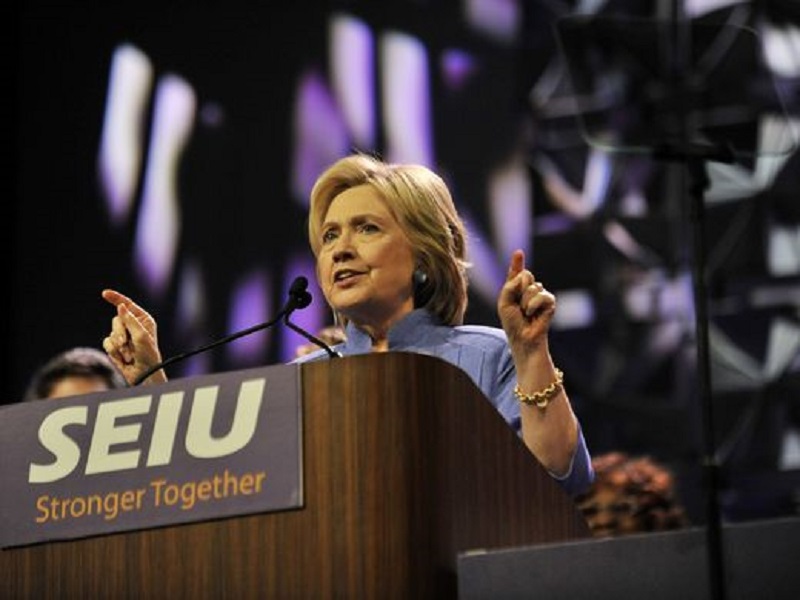
Employees at Lehigh Valley Hospital – Schuylkill East were freed from union bosses’ scheme that forced them to subsidize the politically active SEIU.
WASHINGTON, D.C. – The National Labor Relations Board (NLRB) unanimously overturned a Regional Director’s decision that forced Pennsylvania hospital employees under the so-called “representation” of union bosses, even though the workers opposed the union and had rejected an SEIU organizing drive.
National Right to Work Foundation staff attorneys filed a brief in the case for employees to support the challenge to the Regional Director’s decision.
In 2016, employees at Lehigh Valley Hospital-Schuylkill East completely rejected Service Employees International Union (SEIU) officials’ attempts to unionize their workplace. Union organizers did not even file a petition for an election, which required the signatures of 30% of the hospital workers.
Employees at a separate facility, Schuylkill South, had been unionized for several decades.
SEIU agreed to a plan where some Schuylkill South workers were transferred to Schuylkill East, but kept under the union’s monopoly bargaining representation. Union officials then claimed that the entire Schuylkill East workforce should be included in the monopoly bargaining unit, based in part on the presence of these unionized workers.
In October 2017, NLRB Regional Director Dennis Walsh ordered that Schuylkill East workers should be forced into the slightly larger Schuylkill South monopoly bargaining unit, citing the NLRB’s “accretion” policy that grants union officials the power to absorb workers into a larger unionized workplace without their input. The employees were never given a vote.
Walsh had previously been suspended one month without pay by the NLRB, following an investigation into his use of his position with the NLRB to solicit contributions to a pro-union scholarship fund from union officials with cases at the NLRB. Reports indicate that the SEIU was one of the unions that made payments to Walsh’s fund.
The employer challenged Walsh’s ruling at the NLRB in Washington, D.C., and successfully halted SEIU’s coercive unionization scheme.
“This ruling is a much-needed victory for workers over a shameful union power-grab aided and abetted by a demonstrably partisan Regional Director, who only a few years ago was suspended for his pro-union conduct that violated NLRB ethics rules,” said Mark Mix, president of the National Right to Work Foundation. “Despite the workers in this case successfully resisting an SEIU organizing drive, union bosses attempted to game the NLRB system to force these workers into union forced-dues ranks. The unanimous Board decision overturning the Regional Director’s order is evidence of just how radical the accretion in this case was, and how the accretion doctrine undermines the premise of the National Labor Relations Act which is supposedly based on the idea that workers have a say in whether or not they are unionized.”


